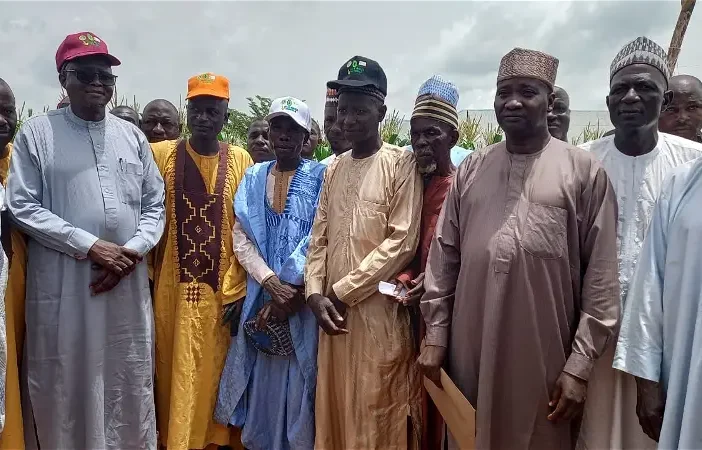The Director of the Institute of Agricultural Research ( IAR) Zaria in Northwest Nigeria, Prof Mohammad. Ishiyaku has said that one of their technologies, the Tela Maize’ s being adopted and translated into economic development of Nigeria by farmers, insisting that within the 101 years of the existence of the IAR, they have spearheaded the adoption of almost all the modern agricultural technologies especially in the North and in Nigeria at large.
Professor Ishiyaku spoke during the Tela Maize Programme for ” Seeing is Believing “of Farmers Field at Kakangi, Giwa Local Government Area of Kaduna State,where he commended the farmers for adopting the Tela Maize technology and assured that it would enhance their economic status and translate into the economic development of Nigeria.
According to him, “adopting a technology that you don’t know much about is very risky. In that vein I would like to appreciate this group of farmers who defied the risk that might be posed to them and adopt the technologies that emanated from.our research laboratories.Although it’s for the betterment of the economic conditions of our farmers and the larger economy of our country,but it takes a lot of heart for anybody to indulge in something that is very new.So I would like to reiterate our appreciation on behalf of our scientists and technologists in the IAR.”
“At the institute it is our pride to see our technologies such as the Tela Maize being adopted and translated into economic development of our country by our farmers.I will like to therefore call on the Local Governments , the state governments and the larger Federal Government of this country, to make agricultural production cheaper so that the margin that will acrue from agricultural activities will be much more profitable, and by so doing agriculture will continue to serve as an employer of labour in this country for up to around 66% of our population which is translated roughly around 160 million Nigerians.”
“This is not by any measure anything that can be done away by any government. We therefore wish to call on, most especially the state governments and Local Governments to do everything possible to ensure that they support our farmers and not only feed our country but also provide an economic development that will translate into the larger economic growth of our country,” he said.
He disclosed that within the 101 years of the existence of the Institute, “it is our pride to commemorate it by counting on the gains we have made.We have spearheaded the adoption of almost all the modern agricultural technologies that you can see , especially in the Northern part of this country and in Nigeria at large.”
“The institute was instrumental in the development of the popular groundnut pyramids,the cotton industry in the country and the numerous varieties of rice, maize, millet and so on.We shall continue to endeavour to improve the lots of agriculture in this country and we would like to solicit the cooperation of our farmers as primary stakeholders in our research and development endeavours,” he said.
In his remarks at the occasion,the Principal Investigator of the Tela Maize project,Prof Rabiu Adamu said the project ‘s all about improved maize variety hybrid for Nigerian farmers.
Prof Adamu explained that Nigerian farmers were being challenged by poor yields of maize, with less than 2 tonnes per hectare.
“With improved maize variety you could get up to 4 tones per hectare.These varieties, some of them have pulled up to 7 tones per hectare under ideal management. Under good management you could get up to 70 bags per hectare.So this trial is conducted as On Farm , that is farmer managed.We brought 4 maize hybrids for him to test and evaluate,and report which he prefers to grow based on his own reasons.”
He said they’ve been doing evaluation in more than 15 locations in the country, and
the one selected by the farmers will guide them in writing proposal for eventual release of the preferred farmers ‘ variety.
“So today we gathered here in Kakangi to conduct ‘ Seeing is Believing ” .We’ve been doing that in our own stations, farmers didn’t know what we are doing but research cannot be done in isolation in your room, you’ve to bring it to the end users,the farmers and us.You are the ones to help us and guide us say these varieties that you’ve been evaluating, you prefer this or that ,please recommend to Federal Government on ways to release it based on this reason or that.”
“That would enable us to write for the releaee of that variety. So this evaluation we are doing today on the threat of Tela maize is for the Fall Army Worm. Some varieties of maize over time have been devastated by the Fall Army Worm. So there is no any resistant variety, all the varieties are tolerant but most of the varieties we are testing under Tela have been proven to be resistant to Fall Army Worm…..but research cannot be complete without bringing the work to the farmers .So this is why we bring the work to the farmers to test and attest that these varieties are resistant. Based on this, they make evaluation and selection to propose release.,” he said.
In his testimony, a farmer, Dan Masani said they got the Tela Maize seeds on the 19th of July and they planted it on the 21st of July, a period 53 days.He said they were happy with the pattern of growth,appreciated its quality and hoped to plant it in the next farming season.
According to him, among the 5 varieties of maize grown on the demonstration farm including their own local variety and the hybrids were given the same treatment, the difference could be noticed as 3 of the Tela varieties were not devastated by worms.
Chairman of the Maize Association of Nigeria ( MAN) in Kaduna State, called on the state government through the Ministry of Agriculture to team up with the Tela project and establish demonstration farms in all the 23 Local Government Areas in the state.
Highlight of the occasion was the question and answer session where Dr Muyideen of the IAR answered numerous questions by the farmers pertaining to the Tela Maize andother sundry agricultural activities




